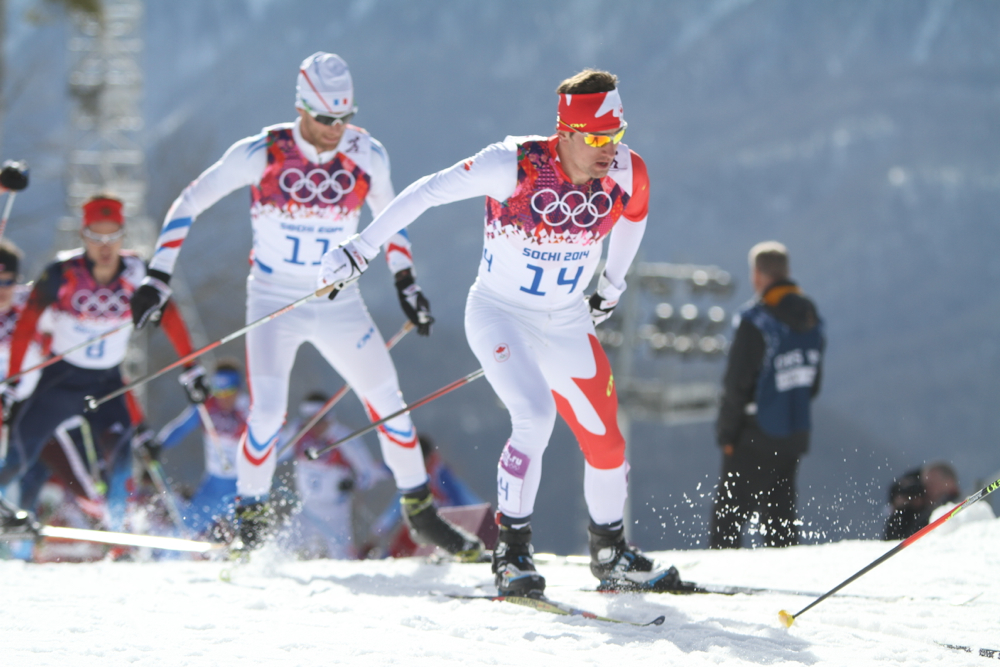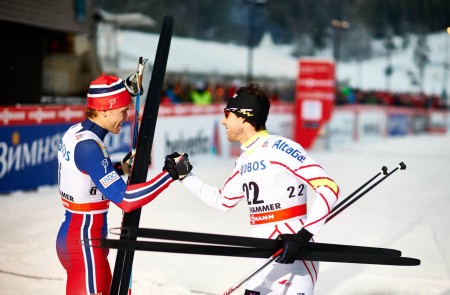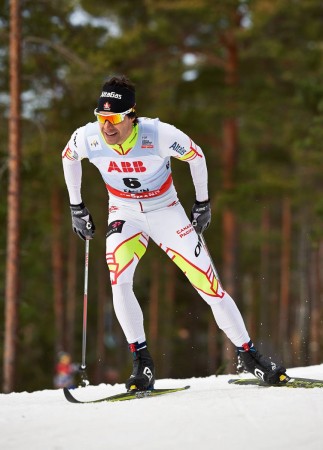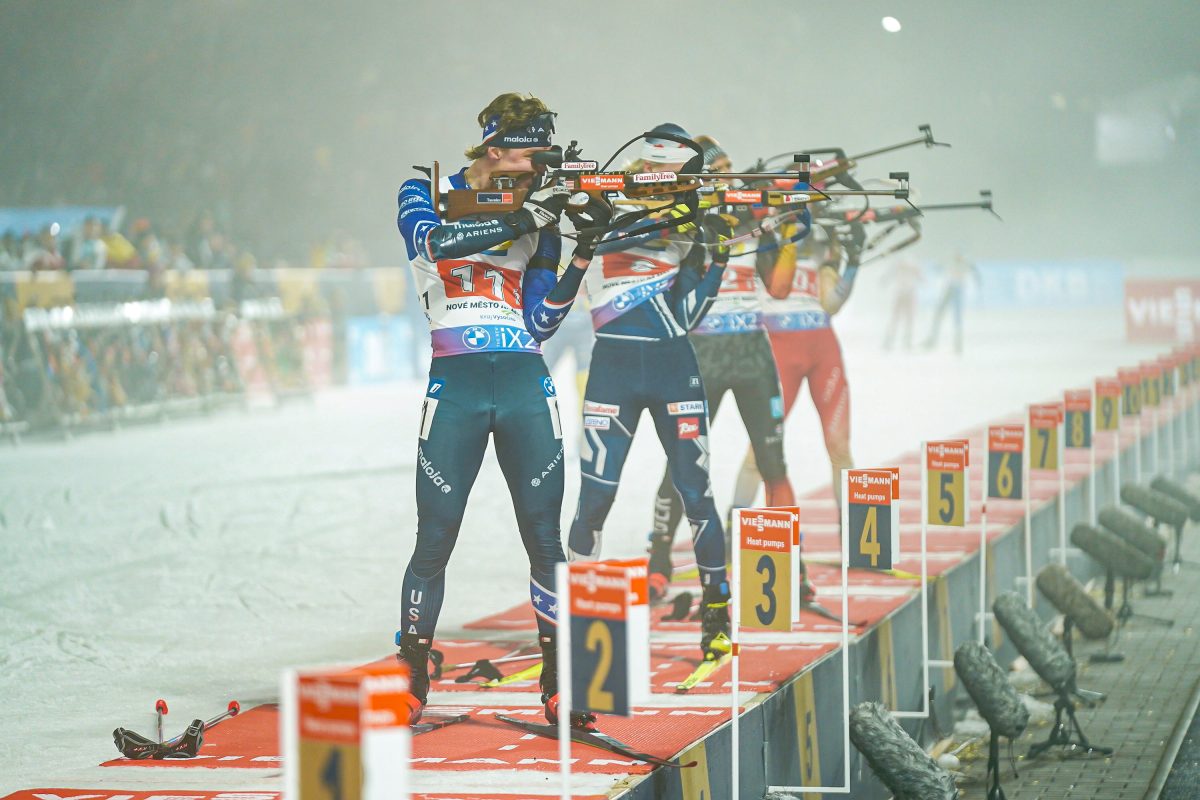
Ivan Babikov heard a lot of chatter at the finish of Saturday’s 10-kilometer freestyle in Lillehammer, Norway, about how tired his competitors were, how much their legs hurt from the relentless hills on the 5 k loop, yadda yadda yadda.
His fellow Canadian World Cup teammate, Alex Harvey said his leg cramped up, too, but not for the same reason. Harvey had a reoccurring issue that cropped up in V1-heavy skate races. Babikov had a problem not feeling any of these things.
“I went as hard as I could, but was still not tired at the finish line,” Babikov said on the phone after placing 43rd, 1 minute, 5 seconds back from Norwegian winner Martin Johnsrud Sundby. “Legs were fine, guys were saying because of the big steep uphill [they were tired] … and I just felt nothing. I couldn’t go any harder than I went.”
That’s a strange feeling for Babikov, who’s gotten used to decent early season results in the last couple years. At the 2012 World Cup opening mini tour in Kuusamo, Finland, he placed 25th overall. That same December at home in Canmore, Alberta, he was 12th in the World Cup skiathlon and 20th in the 15 k classic mass start.
But before that, he was typically a slow starter, he said.
“Usually I need, like, one mass-start race to kind of feel the pace again and get the speed back,” he said. “I don’t know why I’m missing that top speed; it’s hard to tell right now. The season is long, it’s just the first two weekends, and my main goal is Tour de Ski and World Champs in Falun [Sweden]. There’s lots of time to work on it and get the speed back.”
Babikov noted that the speediness of Saturday’s skate course didn’t help him.
“That’s why you can see lots of sprinters and quick guys up there in the top 10 and top 20,” he said. “Still, it’s a really, really hard course. Any other day with fresh snow or just a bit softer [conditions], it would’ve been totally different. It would’ve been so much slower and harder.
“But it was interesting. Really fast. Too fast for my legs,” he added with a laugh.
After finishing 110th in Friday’s skate sprint — a result he said he tried not to dwell on — Babikov went from 110th and 51 seconds behind Lillehammer’s mini-tour leader, to 56th and 1:49 minutes back before Sunday’s 15 k classic pursuit.
“It’s gonna pretty much be a mass start, but with a fast couple kilometers because every single person will try to catch the person ahead of him,” he predicted. “But it’s 15 k and a pretty hard course, [and] there’s some big uphills.
“Hopefully by the third lap, it’s gonna calm down and people are gonna start dying,” Babikov added. “I’ll try to ski my way back into the top 30, but it will be hard.”
“Hopefully by the third lap, it’s gonna calm down and people are gonna start dying.” — Ivan Babikov, Canadian World Cup Team member after placing 43rd in Saturday’s 10 k skate

Harvey expected to feel a little tired after Friday’s sprint, in which he made the finals and placed fifth. But he felt good waking up, during his morning jog and also while warming up for the 10 k.
Sixth in the mini tour to start the day, 11.8 seconds off the lead, Harvey planned to start hard and see what happened on the fast course. Upon hearing his first split around 1.5 k, he knew it wasn’t going so well.
“I was already quite far off, like in 40th or something, so then I didn’t really know what to think so I kept pushing,” Harvey said on the phone.
Heading to the high point of the course, climbing from around 3 to 3.5 k, Harvey started feel a familiar pang in his left leg, caused by a blood-flow issue with his iliac artery that affects him primarily in skate races. All the steep climbing was making his leg tense up.
“I was just fighting against it already and I couldn’t push after that,” Harvey said. “I couldn’t use my leg much, and the downhills were so icy that it was kind of hard to relax and recover so I was always contracting the legs. It was just a really bad day for my leg, I guess.”
Thirty-sixth at 2.2 k, he improved to 25th at the halfway point, but in the middle of his final lap, Harvey was back down to 32nd. He ultimately finished 33rd, 54.6 seconds behind Sundby and 11th in the mini tour after the second day of racing.
Harvey wasn’t surprised his leg plagued him in his first skate race of the season, but said in the past he’s sometimes worked through it.

“That’s happened to me in races where I’ve had good races,” he said. “Even in Falun, there’s a big hill so by the last third of the hill, I feel it in skating but usually it recovers in the downhill. But here today, the downhills were just so icy and so fast … it was just so unstable that you couldn’t really relax the muscles. I was like, ‘OK, it’s happening a bit early, but it’s gonna go away,’ but it just didn’t today.”
Harvey will start the pursuit 59 seconds behind mini-tour leader Finn Hågen Krogh, and 39 seconds behind Sundby in second. Great Britain’s Andrew Musgrave, who placed 13th on Saturday to improve to 10th in the standings, will start at the same time as Harvey, along with Switzerland’s Dario Cologna, who placed ninth in the 10 k for 12th overall.
“I’m looking forward to tomorrow … I’m surrounded by really fast skiers,” Harvey said. “Dario seems to have finally found his way into decent speed at least. Today he was back in the top 10 and there’s gonna be other guys just ahead of me that are good classic skiers, and I think it’s gonna be a good group and I’m expecting a hard battle.”
After Saturday’s race, Canada’s massage therapist worked on his left side — mostly his hip and glutes — to loosen it up. Harvey said he went for a run afterward and felt normal that night.
“Right now it feels a bit tired from a race, but the energy’s good,” he said.
Last year in Lillehammer, he placed 16th in the 15 k classic for his best result of the season at the time.
“The hills are the exact same as we skied today, but it’s always much easier in classic than in skating,” he said. “It’s less muscular and you can use your upper body and you can kind of feather it up the hill.”
Come Sunday morning, during ski testing, Harvey planned to make sure he had plenty of kick.
“You have to make sure you relax anywhere you can on that course because the hills are really long and you gotta hit your stride well,” he said. “The downhills are a bit icy, like today, so speed in the downhill is not gonna be an issue for anybody and there’s no flats.”
He aims to work his way up to Norway’s Niklas Dyrhaug, starting 16 seconds ahead of him in sixth.
“I’ll try to get into a good rhythm the first couple k’s and see who’s pushing hard from the beginning, who wants to try to make seconds to the group ahead of us,” Harvey said. “I’m not planning to lead on the first couple k’s, but if I feel good I’m just gonna try to go up to Dyrhaug and then maybe we’ll see the other guys ahead.
“It’s hard to plan much when it’s a pursuit start like that,” he added. “The real race will start the last five kilometers, that’s where people are really gonna come undone. We see it every year in Kuusamo: the last two laps are where the gaps are made so you just gotta be ready to push hard and suffer.”
Teammate Lenny Valjas, who was 45th in Friday’s sprint, finished 57th on Saturday for 62nd overall.
Devon Kershaw placed 58th, 0.3 seconds behind Valjas and 1:24.6 behind the winner. He’ll start Sunday 66th, 1:58 seconds out of first with Cologna’s younger brother Gianluca Cologna, and 3 seconds behind Valjas.
“Simply put, technically speaking — I skied like total sh*t,” Kershaw wrote in an email. “That was frustrating. I was just not stable at all and my offset [V1] was atrocious — not good when you are racing an offset heavy course.”
Expecting a difficult course, Kershaw said he felt like a character from the “Mortal Combat” Super Nintendo game at the top of the three-minute climb. And he didn’t feel like he was on the winning end of the battle, either.
“I felt like a dude … when he’s about to get destroyed by his opponent (standing there helpless and wavering from side to side about to meet his fate). If I wasn’t so messed up, I bet I could have heard that voice say ‘finish him,’ ” he wrote. “I felt horrible today. Technically skiing very poorly. Bad body, bad legs. It was horrendous.”
“I felt like a dude in the Super Nintendo classic ‘Mortal Combat’ when he’s about to get destroyed by his opponent. … If I wasn’t so messed up, I bet I could have heard that voice say ‘finish him.’ “ — Canadian World Cup Team member Devon Kershaw, after placing 58th in Saturday’s 10 k skate in Lillehammer, Norway
On Sunday, he’ll be looking for redemption.
“Of course, redemption won’t be on the results page since I am in the 60s starting tomorrow. More looking for personal redemption,” Kershaw wrote. “I’m pretty disappointed but actually a bit pissed off to be honest. … I am thankful it’s a classic race tomorrow, and even though I’m back in the field a fair ways, I want to ski aggressive and try and move up as best I can. … Unlike today, I want to hit the technique well, pace it well and have a great last 5km to finish off this Lillehammer mini-tour.”
Canadian development B-team skiers Jesse Cockney and Graeme Killick placed 77th and 94th, respectively, for 76th and 94th overall. Notably, Cockney’s 2.2 k time held up as the fifth-fastest out of 110 finishers.
By 5 k, however, he ranked 46th and was down to 59th at 7.2 k.
In the women’s 5 k earlier in the day, Emily Nishikawa (Development Team) placed 67th for 68th overall, while Perianne Jones (Development B-team) finished 71st for 67th in the standings. Both women were listed to start Sunday’s 10 k classic pursuit, as were Cockney and Killick. Jones will start 1.5 seconds ahead of Nishikawa and 2:11.5 after Norwegian leader Marit Bjørgen.
Alex Kochon
Alex Kochon (alexkochon@gmail.com) is a former FasterSkier editor and roving reporter who never really lost touch with the nordic scene. A freelance writer, editor, and outdoor-loving mom of two, she lives in northeastern New York and enjoys adventuring in the Adirondacks. She shares her passion for sports and recreation as the co-founder of "Ride On! Mountain Bike Trail Guide" and a sales and content contributor at Curated.com. When she's not skiing or chasing her kids around, Alex assists authors as a production and marketing coordinator for iPub Global Connection.



